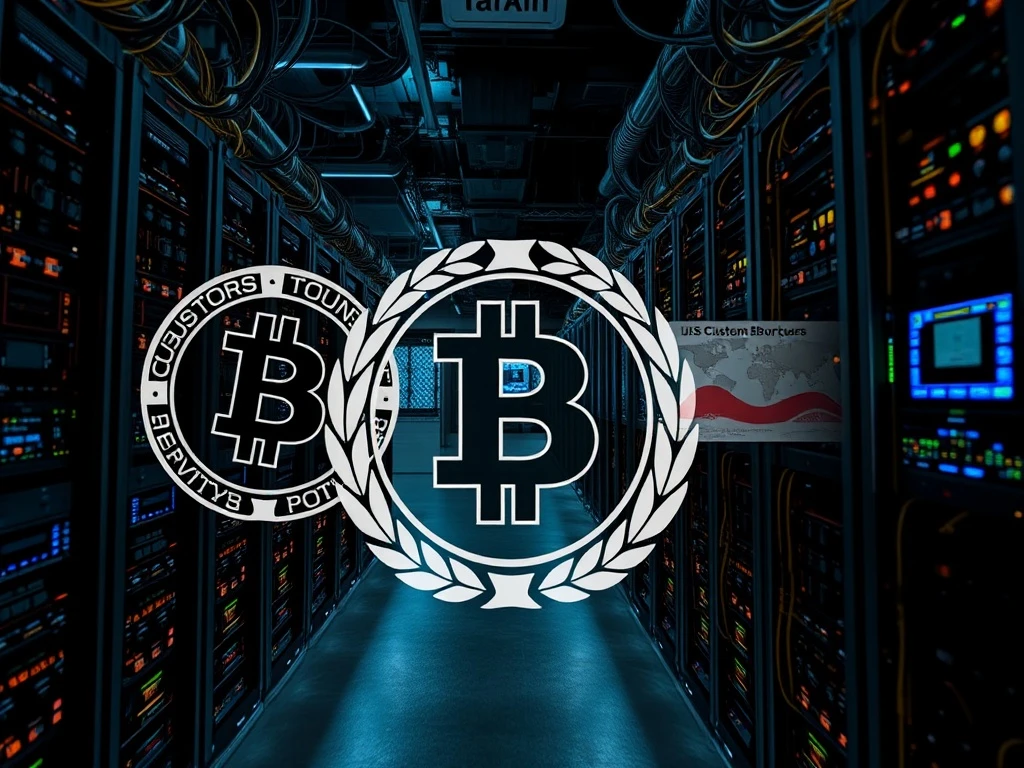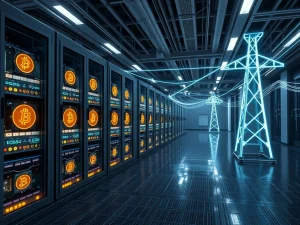US Bitcoin Miners Face Shocking Tariff Liabilities Amid Trade War

The cryptocurrency world often discusses market volatility and technological advancements. However, a less visible but equally impactful storm now hits **US Bitcoin miners**. Escalating trade tensions and modified tariff rates are creating significant financial burdens. Companies like CleanSpark and IREN report massive potential liabilities. This situation highlights a critical shift in the operational landscape for the entire **Bitcoin mining industry**.
Escalating Mining Rigs Tariffs Reshape the Landscape
The US-led trade war significantly impacts the Bitcoin mining sector. Looming disputes with Customs and Border Protection (CBP) threaten American companies. These disputes expose firms to substantial financial liabilities. This critical insight emerged from The Miner Mag’s recent Bitcoin Mining Update. The report examined how mining firms navigate a complex tariff environment. Ongoing US-China trade tensions shape this environment.
The White House modified tariff rates on several Asian countries. Consequently, the effective duty on China-origin mining machines now stands at a staggering **57.6%**. Furthermore, machines from Indonesia, Malaysia, and Thailand face a **21.6%** duty. These increased costs directly affect the acquisition of essential equipment. Therefore, miners must reconsider their sourcing strategies. This evolving tariff policy presents a major challenge for businesses. It reshapes the economic viability of importing mining hardware.
CleanSpark Liabilities and IREN Dispute Unfold
The Miner Mag report specifically highlighted two publicly listed US mining companies. **CleanSpark liabilities** and an **IREN dispute** recently came to light. Both firms received invoices from CBP. These invoices allege that some of their equipment originated in China. This development underscores the severity of the tariff situation. Such allegations can lead to significant financial penalties.
CleanSpark, a prominent miner, warned of potential liabilities reaching up to **$185 million**. This massive sum represents a considerable financial risk for the company. Similarly, IREN is currently contesting a separate **$100 million dispute** with the agency. These disputes are not mere administrative hurdles. They represent substantial financial threats. These liabilities could impact company balance sheets and future investment plans. Therefore, legal and financial teams within these companies are working intensely to address these claims.
Broader Impact on the Bitcoin Mining Industry
Beyond the direct tariff costs, the overall **Bitcoin mining industry** faces ongoing pressure. Mining revenues remain under strain. The network’s hash price, for instance, remains below $60 petahashes per second. This metric indicates the profitability of mining operations. Moreover, transaction fees have declined. They now sit below 1% of block rewards. Both factors contribute to shrinking profit margins for miners.
Despite these challenges, some companies continue strong production. IREN and MARA Holdings each produced over 700 BTC in July. This demonstrates operational resilience within the sector. However, the decreasing profitability puts immense pressure on less efficient or highly leveraged operations. Consequently, the industry must innovate. Miners need to find new ways to optimize costs and enhance efficiency. The tariff situation only adds another layer of complexity to these existing pressures.
Adapting to New Realities: Supply Chain Diversification
The Bitcoin mining industry constantly adapts. It grapples with rising costs, shrinking margins, and growing regulatory risks. The ongoing trade war significantly accelerated this trend. Miners must now become more sophisticated importers. They also need to diversify their supply chains. This strategic shift aims to mitigate the impact of escalating tariffs.
Some analysts suggest that US tariffs on mining equipment could dampen domestic demand for rigs. This might give an advantage to operators abroad. However, the ultimate impact will depend on future US tariff policy. On the hardware front, Chinese manufacturers are also adapting. Bitmain, Canaan, and MicroBT, for example, have started establishing facilities in the United States. This move helps them mitigate the impact of tariffs. Canaan’s strategy particularly stands out. The company not only shifted its headquarters to Singapore. It also announced US investments. These investments aim specifically at sidestepping trade barriers. This proactive approach ensures continued access to the lucrative US market. It also highlights the global nature of the **Bitcoin mining industry**.
The Future of US Bitcoin Mining Amid Regulatory Pressures
The landscape for **US Bitcoin miners** continues to evolve rapidly. The current tariff situation adds a significant layer of complexity. Miners must navigate both economic pressures and regulatory uncertainties. Companies like American Bitcoin, backed by members of former US President Donald Trump’s family, still pursue large acquisitions. Earlier this month, American Bitcoin exercised an option to acquire over 16,000 mining rigs from Bitmain. Importantly, this agreement excludes any potential price impact from tariffs, as Crypto News Insights reported.
Bitcoin mining suppliers also face pressure to adapt. They must innovate their products and services. For instance, Jack Dorsey’s Block targets a 10-year lifecycle for Bitcoin mining rigs. This focus on longevity aims to reduce operational costs over time. The industry must find sustainable solutions. It must balance profitability with compliance. Ultimately, the future success of US Bitcoin mining will hinge on its ability to adapt. It must effectively manage both trade policy changes and market dynamics. The ongoing challenges demand strategic foresight and operational agility from all participants.









